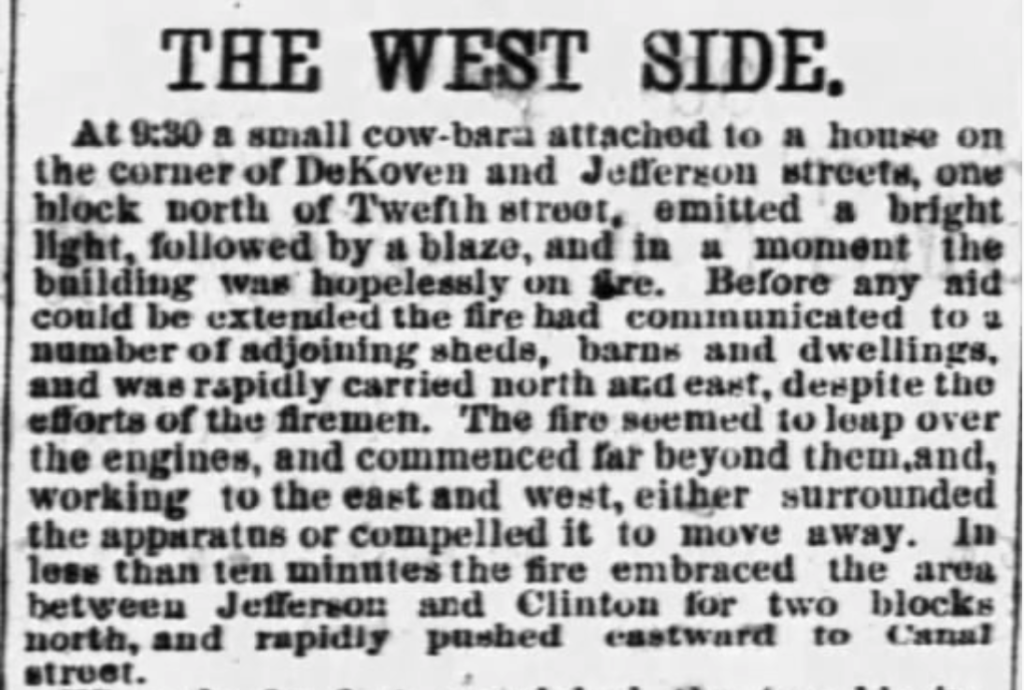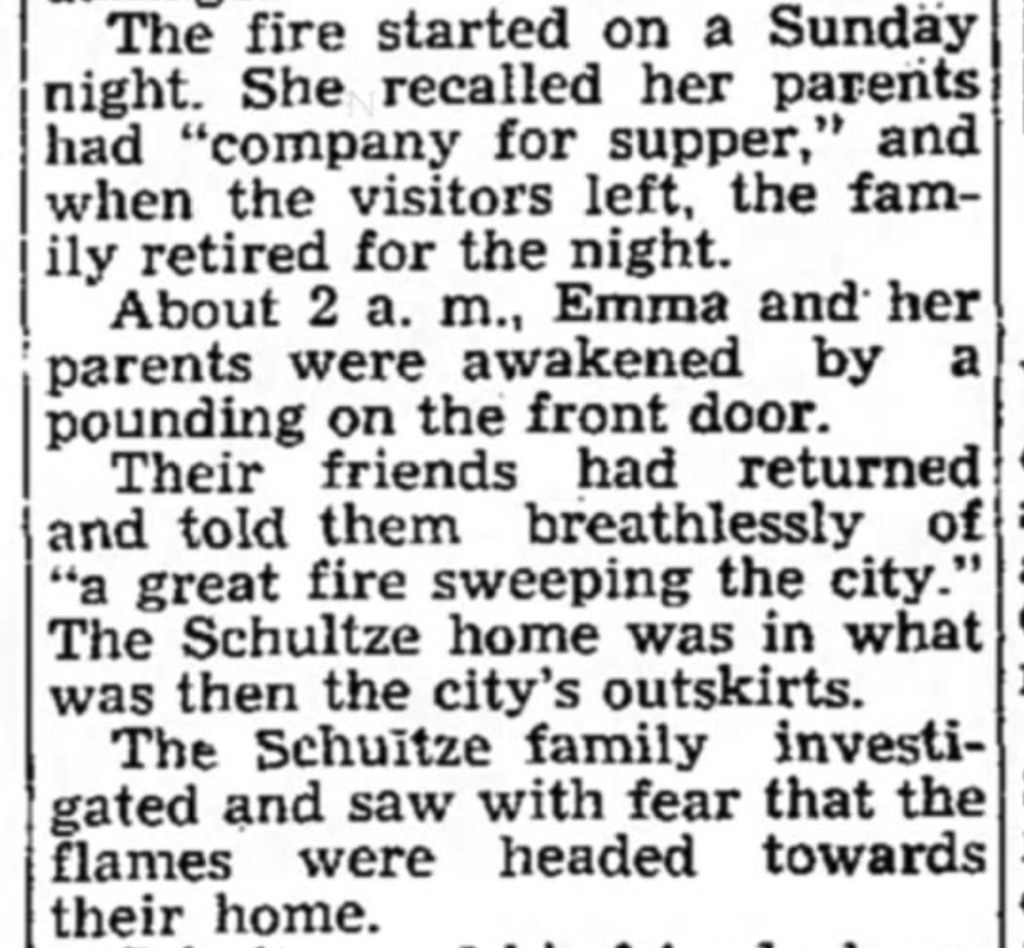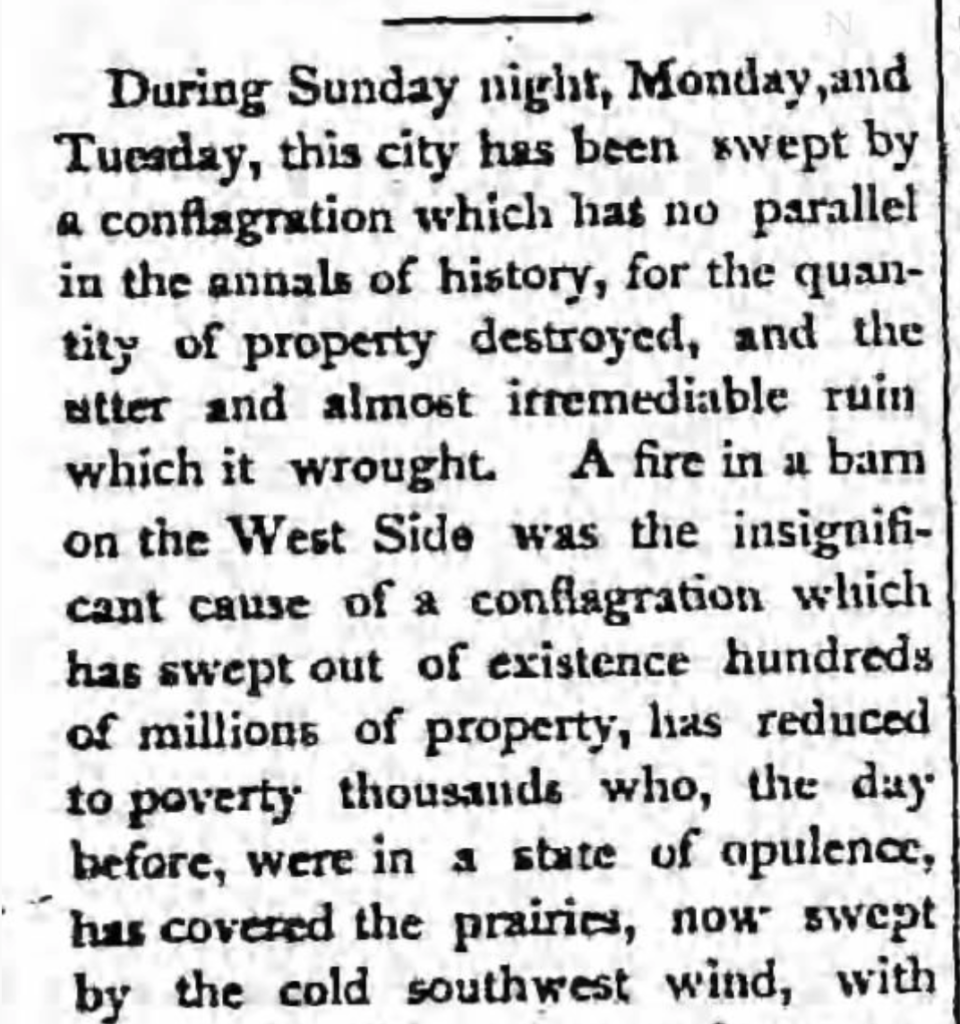On the evening of October 8, 1871, Catherine O’Leary stepped outside her house in Southwest Chicago. She fed the horses and led them to the barn before retiring for the night. Catherine and her husband Patrick were already in bed when a neighbor noticed flames coming from their barn. He alerted the O’Learys’, but dry and windy conditions allowed the fire to grow out of control. Within ten minutes, two blocks were ablaze. The fire came to be known as the Great Chicago Fire, and by October 10th, it consumed some five square miles. More than 17,000 buildings burned to the ground, and 300 people died. Although folklore states that the fire began when Catherine’s cow kicked over an oil lamp, no one really knows how it started. This month marks the 150th anniversary of the fire.
Chicago was incorporated in the 1830s and grew to become the world’s largest grain port by the 1850s. The city was built predominantly of wood and was prone to fires. It had been unusually hot and dry in Chicago that fall, and the area was experiencing a drought. When the fire started at the O’Leary farm, tinderbox conditions quickly led to a firestorm that overwhelmed the city. Firefighters attempted to douse the massive flames, but the city’s waterworks burned and cut off water to the hydrants.
As the fire spread, it jumped the south branch of the Chicago River and destroyed much of central Chicago before jumping the river again and consuming the Near North Side. Windswept sparks landed on roofs and sheds, starting new fires. The fire burned for about another 24 hours, essentially unchecked.
Emma Schultze was 8 years old at the time. She recalled that her family woke at 2:00 a.m. to friends pounding on the door, telling them the city was ablaze. Although they lived on the outskirts of town, the Schultze family saw flames headed in their direction. Emma’s father dug a hole in the front yard and dumped in the family linen, silver, dishes, bedding, and even furniture. Emma’s mother quickly dressed her in layer after layer of petticoats and dresses. Finally, with their arms laden with household items, the family set out on foot towards the home of a friend. Several days later, they returned to find the smoldering foundation of their home. As they explored the ruins, hot ashes burned the soles of their shoes off. The Schultze family joined more than 100,000 people left homeless in the wake of the fire.
The Chicago Tribune, unable to publish papers on October 9th or 10th, described the scene in the October 11th edition. “This city has been swept by a conflagration which has no parallel in the annals of history.” By the night of the 9th, the fire began to burn itself out. A light rainstorm that night helped douse the final hot spots.
Reconstruction began almost immediately, and relief poured in from around the country and abroad. Railroads offered free passage to those who wanted to leave. Improved building techniques and updated fire standards helped Chicagoans rebuild and emerge as a modern city. Just two decades later, Congress named Chicago the host city for the 1893 World’s Fair.
If you would like to learn more about the Great Chicago Fire, search Newspapers.com™ today or visit our Great Chicago Fire Topic Page to see curated clippings related to the fire.
Like this post? Try one of these:
The Peshtigo Fire: October 8, 1871





The Great Peshtigo Fire that was burning at the same time was much worse. My Great-great Grandparents were burned out and had to flee for their lives to Sturgeon Bay, Wisconsin.
The Peshtigo fire was devastating! Here’s a link to a blog we wrote about that a couple of years ago. https://blog.newspapers.com/the-peshtigo-fire-october-8-1871/
I’m glad the Peshtigo fire has been covered as its own event; still, I too read this article about the Chicago fire hoping to see a brief acknowledgement that the Chicago fire (while far more property damage was involved) eclipsed the story of the deadlier Peshtigo fire not far to the north.
My great aunt’s husband experienced the loss of his future first wife’s mother and her toddler daughter. His wife suffered from the after-effects of the fire her whole life and died at 32, leaving two small children. Nick then married my great aunt. Not many seem to know of this fire and its consequences. I visited the museum. So sad.
wow thats crazy
In fact the Peshtigo Fire was so devastating that it eventually caused my Great great grandmother to lose her mind. She ended up at the Oshkosh State Mental Hospital. The family often referred to her sadly as some old crazy woman, as if she were a stranger.
Thank you for your research in this Chicago Fire, I’m from Chicago 1937 and more history is what I want.
My great grandfather, Eugene Barton Wight, was devastated by the fire. He was a lawyer with Melville Fuller who became the 50th Supreme Court Chief Justice but did editorial work with the Chicago Tribune. Wiped out, he took a job in Washington, DC, and became a well known Washington correspondent for the Trib, NY Times, Boston Journal, and more.
We forget history and to a certain extent – It’s sad that the country as a whole hasn’t required home fire sprinklers.In new construction.
We put sprinklers in one of our buildings and I wish we hadn’t. Not only were they incredibly expensive we had to install a tank farm of 9 tanks because the city water supply on the street was not big enough. We spent a fortune on the bulkheads. On top of that you have to have them regularly inspected and serviced. I now fear having someone set them off and having water damage. In our area fire risk is pretty low. I’d rather right size my insurance.
The Chicago fire consumed 3200 acres and 300 lives, the Peshtigo Fire 1,250,000 acres and upwards of 2500 lives. Greatest loss of life to a wildfire in US history.
Any more detail on possible meteorite shower in the Midwest as the cause.
My Great Grandfather had just that spring immigrated to Minneapolis from Holland. He was a master carpenter. After the fire a call went out to any who could help rebuild Chicago after the catastrophe. My Great Grandfather Reinier Boldingh went to Chicago and spent several months helping rebuild the burned out areas. His specialty was wooden interiors of public buildings and churches. He refers to this in letters he wrote to his sister in Holland.
The mosty horrific fires have been man-made and tatolly intentended to burn women and children alive. Friends in Germany described what they saw in Dresen, Nuremberg, Berlin, Frankfurt, and Hamburg.
A majority of the adult victims had been supporters of Hitler and German conquest and viciousness.
What does this have to do with the price of tea in China? Hitler wasn’t even born until 1889.Stick with the subject
War is hell. No descriptions make it sound attractive, yet we do it. But human failings are not the point of this particular blog, are they?
Sad to see what Chicago has become today. Fire is the last thing to worry about now. Bullets and politics are the dangers of our time now.
Just stop with your trumpsychosis QAnut racism.
The truth is difficult to deal with, but Chicago is a dangerous city to live in. Bullets are not racist, they will maim and kill anyone.
Compared to the loss of life to fires, bad water, poor nutrition, poverty, diseases we can now prevent with vaccines, antibodies and healthcare, etc. the current circumstances don’t even come close to living in Chicago at that time. You were fortunate if even a majority of your children survived to adulthood.
My great great grandfather, Henry V. Coleman, was an engineer on No. 24 in the Chicago fire department and was working with No.5 that evening, After arriving at the fire scene, the hot steam burst their hoses, rendering them useless.
My great grandfather William Henry Whitchurch lived on Ohio Street near Lake Michigan. He and my great grandmother Margaret waded Into the lake when the fire approached. I have 2 teaspoons which she stuck in her bodice to save.
What a great story! My great grandfather was a Chicago policeman, and he and his daughter used to swim in the lake every morning. Do you have and use the two spoons?
I don’t use them, but am going to frame them and give them to two Grandsons!
An excellent plan!
My grandfather built my childhood home with Chicago brick in 1963. It was salvaged from the fire described in this article. It was charred back in s lot of areas. I didn’t understand why ours was the only house that had this! A few months ago, I found out the present owners had painted the bricks WHITE!!! They obviously did not know what they were covering up!!!
Did anyone tell them? I would have left the historical information for new owners to see. In fact, I have it written up for my house so new owners, when I sell, will know the history.
My gr gr grandfather John Quigley and a friend Richard Riley lived in the neighborhood of the O’Leary’s and actually organized a brigade of neighbors who were about to lose their homes from the fire. They commandeered a steam engine from Fire Marshall Robert Williams and succeeded in limiting the Fire’s movement into their neighborhood, but the Fire progressed in the opposite direction burning the city. It’s all told in the 10 Oct 1897 edition of THE CHICAGO CHRONICLE.
When I purchased my first book about members of my family, I read about Lafayette Wallace Case MD. “Shortly after graduating, Dr. Case was appointed physician to North-Chicago Charity Dispensary, and occupied that position at the time of the great fire in 1871.” They saved some things from the fire and they received $100 worth of medicines. They used space at the Newberry School for a free dispensary for sufferers from the fire. All the pharmacies had burned.
Is there a list anywhere of all the firefighters who fought the great Chicago fire? My great grandfather was one of them. I’d like to know more about his company.
Obviously another victim of Global Warming.
My great great grand father,lost his land to that fire, And fought in court for many years, The lawyers got most of the money awarded to him.So many of the land ,Is famous land spots in Chicago. Sad.
My husband’s Wicker ancestors were among those who lost the records of their numerous property holdings in the fire.
A woman later named Mrs. Amelia Desrochers survived the great Peshtigo fire of 1871, as a 5-year-old girl. When she died in August 1966 at age 100 she was believed the second-to-last survivor of that disaster and last living person to actually recall it (a man in California named Joseph Prue survived the blaze but at age 3 months – he lived until March 1969). Mrs. Desrochers lived her later years in Green Bay, a survivor of the hand fate sometimes indiscriminately deals. But fate rarely likes to be tempted. Her grandson, Jerome R. Estes, U.S. Coast Guard, and his wife, Olga, of Green Bay, were two of the 490 individuals killed in the horrific Cocoanut Grove night club fire in Boston on November 28, 1942 (for more see spotlight on Mrs. Desroches in Green Bay Press-Gazette, Friday, June 24, 1966).
David, We have an article planned for November about the Cocoanut Grove fire. Another tragic fire.
Hi Jenny,
I am actually the historian for a project called Cocoanut Grove Coalition, which is how I originally came to know of Mrs. Desrochers and her Peshtigo Fire connection (because of her Cocoanut Grove-victim grandson). The Coalition has been working for several years to erect a memorial in Boston to acknowledge the tragedy. For some years the Grove site was marked by a plaque crafted by one of the fire survivors. But in 2017 a developer erected a rather non-descript ultra-luxury condo building on the footprint of the Grove and demanded all references to the fire be removed. All of the legal and funding hurdles have now been passed, and our memorial will rise in a small park not far from the scene. I have researched Cocoanut Grove for nearly 20 years and would be glad to offer any assistance for your upcoming article. There is much information on the topic online, some of it very good and some very bad. You may be interested to know that as of late 2021 three confirmed survivors of the tragedy are still living – one in Massachusetts, one in Maryland and one in Florida. We have maintained contact – all three are now aged 97.
We think of the Chicago Fire as being in relatively “modern times” but it was 5 years later that we had the Battle of the Little Bighorn 1100 miles to the west.
Thanks for sharing all your families’ connections to the fire.
Despite the Great Chicago Fire, my great-great grandparent’s marriage record survived, so I assume they protected the public buildings, at least.